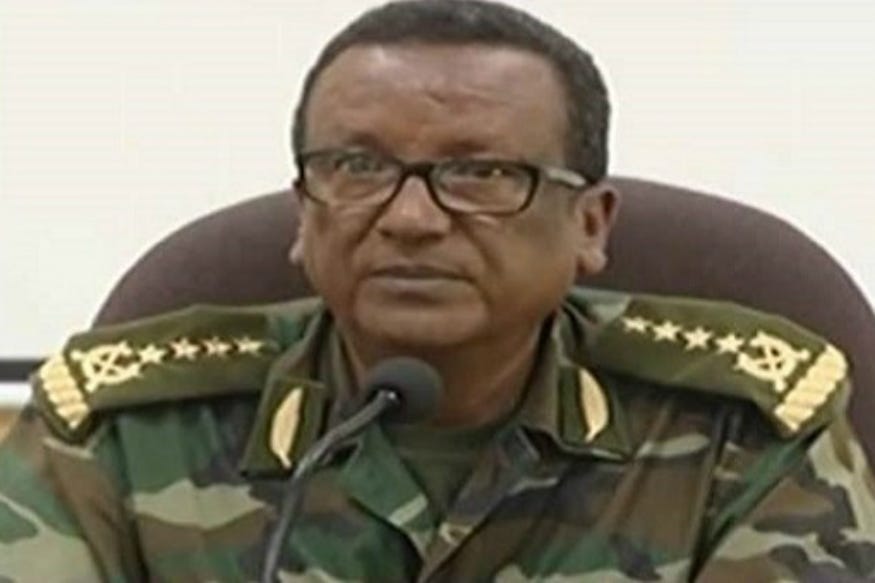Date: Thursday, 27 June 2019
On the evening of Saturday, June 22, the Spokesperson for Office of the Prime Minister announced on state TV that a coup was attempted in the Amhara Regional State and that senior officials of the regional state were killed. A few hours later, Prime Minister Abiy Ahmed appeared on state TV, clad in a military suit, to reaffirm the spokesperson’s announcement.
However, in Bahir Dar, where the ‘attempted coup’ took place, and elsewhere in the Amhara region, people have different opinions. People here strongly believe that the cause of the deadly violence is an attempt by the federal government to unlawfully apprehend General Asamnew Tsege, who is identified in government propaganda as ‘the ring leader of the attempted coup’. General Asamnew was the head of the security bureau of the Amhara region.

Some observers trust that General Asamnew ordered the attack against senior political leaders who caved in to pressure from the central government to remove him from his post and arrest him. Others argue that the killing could be the work of federal security operatives, who wanted to create a pretext to get rid of not only General Asamnew but also unwanted senior regional leaders.
By branding General Asamnew’s desprate action as a coup, Abiy Ahmed’s government seems intent on distracting the public from the real cause of the deadly violence. Blockade of the internet means that people have to rely on state media for information.
Who is General Asamnew Tsege?
Asamnew Tsege was a veteran of the decades long military insurgency against the Derg regime. After the Ethiopian People’s Revolutionary Democratic Front (EPRDF) deposed the Derg regime and assumed state power in 1991, Asamnew joined the Ethiopian Defense Force and rose to the rank of Brigadier General.
In 2008, frustrated by the lack of democratic progress in the country, General Asamnew led a failed coup attempt. He was captured right away and sentenced for life in prison along with his associates. After serving ten years in prison, he was released in 2018 as part of Abiy Ahmed’s overture to free political prisoners. Soon after his release, he was appointed to lead the security bureau of the Amhara Regional State.
As chief of the security bureau, General Asamnew quickly won the hearts and minds of the Amhara people. In the eyes of many in the region, he did an admirable job securing the region from hostile forces. He has vigorously dealt with serious security challenges, including a bloody conflict between the Amhara and Qemant people in the Northern part of the region and a military attack led by OLF-linked militia group in the eastern part of the region. People also respected General Asamenew’s unwavering pro-Amhara stance in a political environment marked by ethnic tensions and conflicts.
Why did General Asamnew fall out with Prime Minister Abiy Ahmed?
While praised internationally as a young, charismatic and reform-minded leader, Prime Minister Abiy Ahmed is facing growing opposition domestically for failing to establish peace and stability in the country.
The Prime Minister is widely viewed as unwilling to take action against armed Oromo groups. Since the Oromo Liberation Front (OLF) entered the country in 2018, agreeing to put down their arms and engage in peaceful politics, OLF-linked soldiers have routinely carried out deadly military attacks in and around the Oromo region. Hundreds of thousands of people were internally displaced as a result of these attacks. Public officials were assassinated, commercial banks were robbed and foreign companies were attacked and ransacked in the hands of OLF militants.
Prime Minister Abiy Ahmed and his administration has turned a blind eye to these criminal activities, aggravating the security breakdown in the country.
General Asamnew Tsege was staunchly opposed against Abiy Ahmed’s policy of playing down the security crisis in the Oromo region while meddling in the security affairs of other regional states. The General has publicly expressed his dissatisfaction against Abiy Ahmed’s policy of pampering armed Oromo groups and gangs.
Who killed the army Chief?
Several hours after the deadly violence in Bahir Dar, the Chief of Staff of the Ethiopian Defense Force, General Seare Mekonnen, was assassinated at his home in the capital. His long time friend, Major General Gezai Abera, who was with Seare at the time, was also killed.

The government claimed that the killing was part of the attempted coup in Bahir Dar, a claim that is remotely convincing. To begin with, General Asamnew’s military influence was confined to the Amhara region at best. He did not have the means to successfully coordinate a high-level assassination in Addis. Moreover, my well-placed sources confided to me that General Seare was as frustrated with the deteriorating security situation in the country as General Asamnew. If anything, the two generals were more likely to be allies than adversaries.
The assassination is most likely the work of military elements seeking to eliminate the Chief of Staff.
General Seare was one of the few experienced Tigrean generals who was not forced into retirement following Abiy Ahmed’s ascent to power. Now that he is out of the way, the deputy Chief of Staff, Birhanu Jula, who is an Oromo, will likely replace him, ensuring Oromos’ complete control of the country’s military and security establishment. Such sweeping control of military institutions by a single ethnic group is reminiscent of Tigrean domination during Prime Minister Meles Zenawi’s era.
What’s next?
Abiy Ahmed will likely exert pressure on the surviving political leadership of the Amhara region to install a loyalist as president of the Regional State. He will also seek to prolong the army’s takeover of the Amhara region. There are already reports of large scale crack down taking place in the aftermath of the Bahir Dar incident. These moves will not bode well for the region, as they stoke up ethnic tensions and lead to a further deterioration of security in the region, and beyond.
About the author:
*The writer is an associate professor of public administration at Bahir Dar University and could be reached at etmobileq@gmail.com.